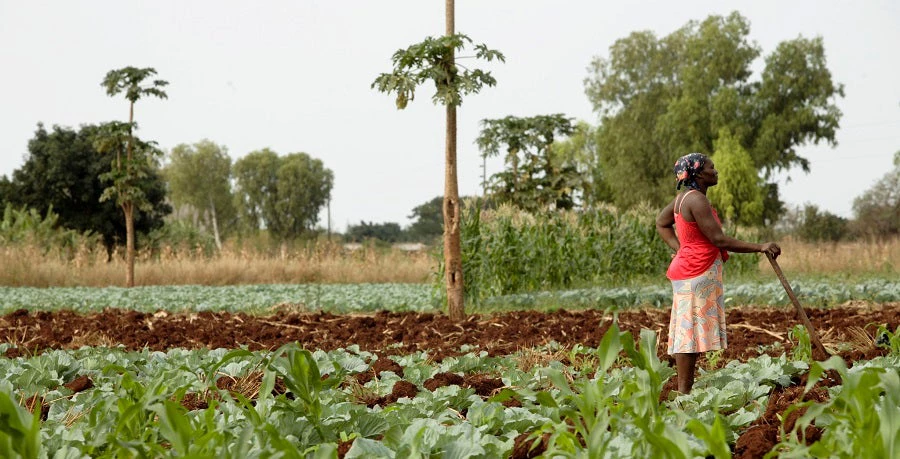 More and better agriculture jobs in Mozambique desperately needed, but not certain. Photo: John Hogg / World Bank
More and better agriculture jobs in Mozambique desperately needed, but not certain. Photo: John Hogg / World Bank
In Mozambique, there’s been hope that investment in the country’s growing oil and gas sector will bring rapid growth and better jobs. However, due to their capital-intensive nature, these investments will only result in a limited number of new direct jobs.
Why agriculture and food production are a better bet?
Agriculture already accounts for 70 percent of current jobs in Mozambique. These are mostly low-productivity activities on smallholder farms. Agriculture and food value chains also account for roughly a quarter of total formal sector employment, and this share of formal employment has been growing over time.
In line with trends across Sub-Saharan Africa, as incomes rise and urbanization occurs, most of the food systems’ related jobs will be in processing and services such as packaging, distribution, and commercialization. In Mozambique, for the foreseeable future, at least two-thirds of new labor force entrants will need to be absorbed in agriculture and food, both on and off farms. Many of these new waged jobs will be within better reach of the poor, and often also of women.
How to promote quality agriculture jobs?
Our new publication, “More and Better Jobs From Crops and Trees in Mozambique,” highlights strategies to create quality agriculture jobs in Mozambique. Our study focuses on value chains for cassava, cashew, and plantation forestry, based on case studies carried out in 2018-2020 by the Let’s Work Partnership.
Below are three key policy recommendations highlighted in the publication:
It’s critical to boost agricultural productivity in Mozambique to reduce unit costs of production and make producer incomes more resilient to climate shocks. Climate change, distortions in global agricultural markets for Mozambique’s products, and “Dutch Disease” from the macroeconomic effects of oil and gas development will inevitably increase the ratio of agricultural unit costs compared to agricultural output prices.
2. Re-focus public sector support on enhancing productivity and building market linkages in agri-food chains
Other recent World Bank research demonstrates that although the share of public spending in agriculture in Mozambique is relatively high, almost all of it is in the form of price support to larger farms and intermediaries. The share of public spending on the agricultural goods and services that support the productivity of all producers is one of the lowest in the world, at less than 1 percent of agricultural GDP, compared to about 3 percent Africa wide and 6 percent in the OECD, according to the World Bank Report. Only one-fourth of this one percent goes toward research and extension, critical to raising agricultural yields and boosting resilience to climate change. Not surprisingly, Mozambique’s average cassava yields are lower in comparison to West Africa’s and are one-half to one-third of yields in Latin American or Asia. For cashew, yields average 3 kg/tree, compared to 5kg/tree in neighboring countries, due to aging of trees, lack of trimming, and lack of spraying for disease and pests.
3. Encourage better coordination along whole supply chains
There must be proactive multi-stakeholder engagement on whole value chain responses to international trade, quality, and productivity issues affecting Mozambique’s agricultural trade. Presently, responses to problems in these areas have been approached as a zero-sum game pitting different parts of value chains against each other. Subsidies or protection to one part of an export chain, typically processors, resolve their short-term problems through policy subsidies. However, where countries are price-takers on the international market, these subsidies only shift the burden on upstream (unsubsidized) parts of chains, especially smallholder farmers. This reduces their incomes and their stake in building the productivity, quality, and reliability as suppliers that ultimately domestic processors must rely on to be successful. Ultimately, everyone loses.
Cashew is a good example. Fluctuating markets for low quality exports to Asia have led processors to seek protection through an export tax on raw cashew nut (RCN) of 18-22% (while it is zero for processed kernels and the law also bans exports entirely during the first months of the harvest) rather than making their processes more efficient and of better quality — that effectively is borne by domestic RCN producers. The latter in turn are barely maintaining production of declining quality, or opting out altogether, further aggravating the problem of processors.
The cost of inaction
Time is running out for Mozambican agriculture: imminent events in the macroeconomy associated with oil and gas development likely will drive incentives in the national economy rapidly away from agriculture , while the effects of climate change worsen. Failure to invest in smallholder agricultural productivity and better coordination of agricultural supply chains implies that most of the population, which still lives in rural areas, will face low and uncertain livelihoods. The half-million annual new entrants to the labor force will understandably look elsewhere but may not find what they seek.



Join the Conversation